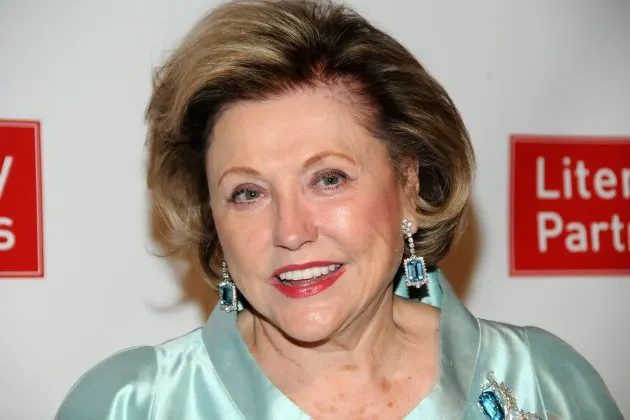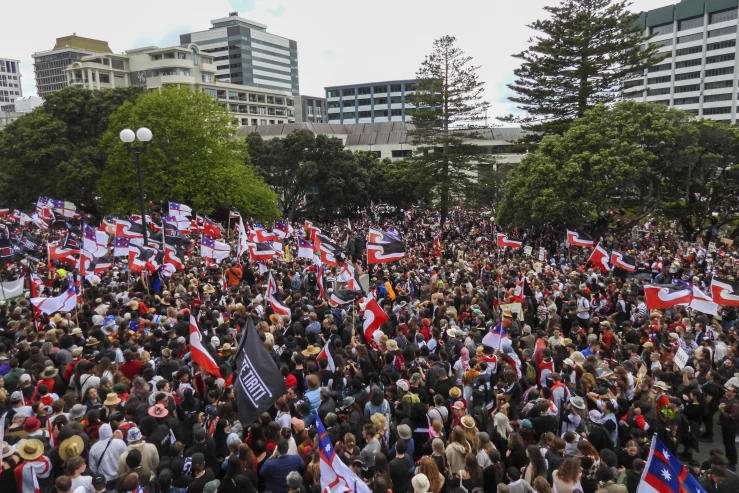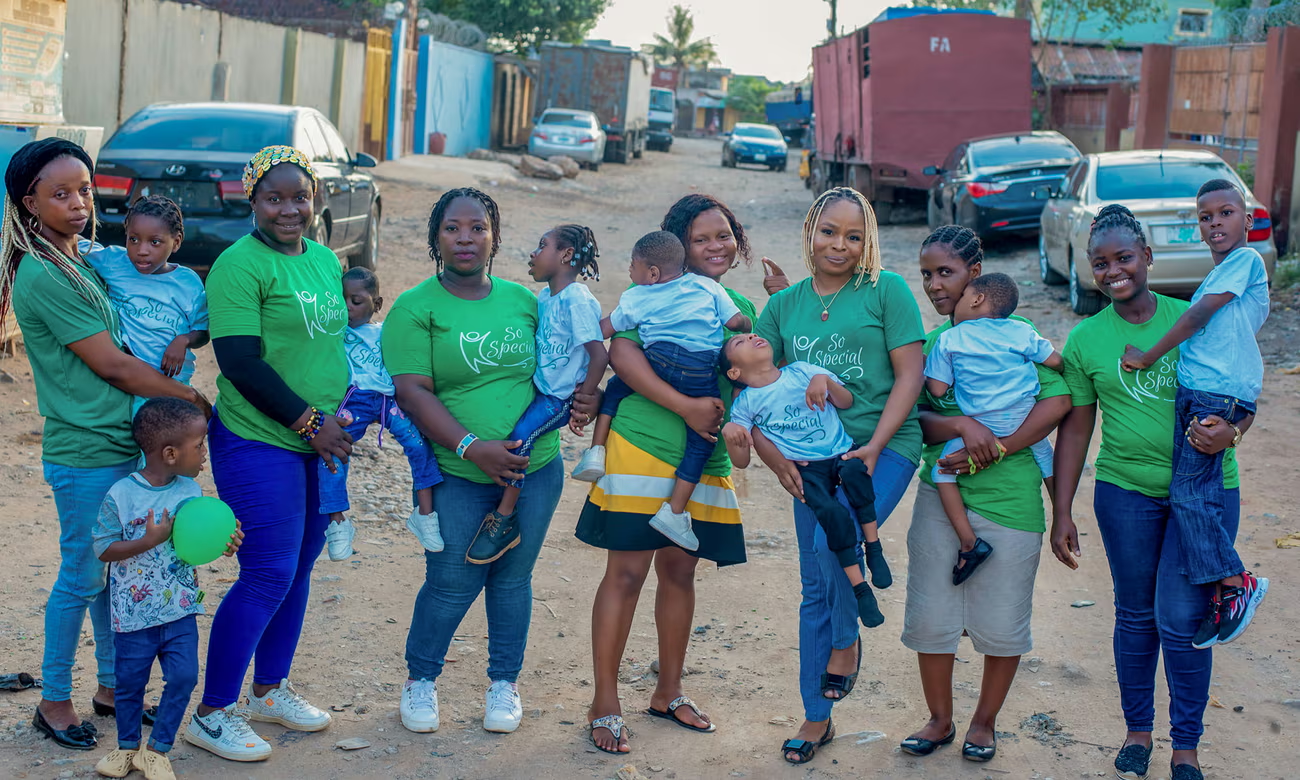
“Mothers Navigate Heartbreak: Jodie’s Journey with Her Son’s Rare Condition”
Mothers , Joy would have been the having of a baby, having a baby, especially after her hit song “Kuchi Kuchi” stood to become Nigeria’s love anthem and her memorable appearance on Idols West Africa captivated a television audience. The joy was, however defeated when her son was born with lissencephaly, a rare brain disorder, and cerebral palsy.
Her friends started avoiding her. I was dealing with heartbreak, and at the same time, my son’s health also suffered. I got so frustrated and helpless that I ended up shaving my head completely, she says.
Mothers run into the world’s most unimaginable conditions. For me, that started when my doctors told me that my child was likely never to survive more than two years. Then they explained that the condition was incurable and that surgery couldn’t help. In order to grapple with this reality, I realized I needed to toughen up a bit, so I stopped music and took a nine-to-five job for a year to get distracted. Many times, I felt like crying during long hours of commute through the traffic of Lagos.

Mothers Championing Change for Children with Special Needs
Odiete recounts she was trolled and lambasted in public when she first began posting pictures of her singing with her baby boy Chinua. “I posted pictures of my baby, and people would say something is wrong with him. Some said I wanted to abort him; that’s false, of course. But despite all this negativity, sharing made me feel better, so I kept doing it.
Mothers
I did not want to hide him forever. This is the world he has come into, and I want people to accept him for who he is.” — motivated her to go and found the Chinua Children Care Foundation to help out other families with children who have special needs, helping them achieve a better form of education and welfare for them.
However, in a place like Nigeria, where poverty is as rife as malaria and HIV, dependency is frightening and even shameful. Oluwakemi Oluwakoyode can vouch for this; her daughter, Oluwaponmile, has cerebral palsy. Health workers were mute regarding Oluwaponmile’s condition, unwilling to inform the parents as they were aware of the shadows of stigma and fear surrounding disabilities in Nigeria, which leads to their abandonment or rejection.
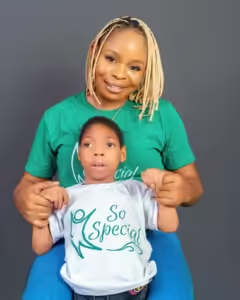 Mothers Facing Stigma and Isolation
Mothers Facing Stigma and Isolation
Oluwakayode could no longer hold down her position as headteacher at a primary school in Lagos because her daughter, Oluwaponmile, was having seizures frequently. In her community, it was understood that disabilities constituted a form of curse, correlating with witchcraft in parts of West Africa.
Some people advised me to kill my baby and dispose of her, Oluwakayode remembers. “I stopped taking public buses due to the comments I got and went for taxis instead, no matter the cost, anytime I took her for therapy, I was gradually slipping into depression.”.
She placed Oluwaponmile in a private school, but after several days, the management asked her to pull her daughter out. Several parents threatened to take their children out if Oluwaponmile were not withdrawn from that class. “They degraded my child’s dignity, labeling her an ‘imbecile.’ They made me feel that having a child with special needs was something one had cause to be ashamed of,” she says.
Dr. Murtala Yusuf, faculty of education, Usmanu Danfodiyo University, Sokoto, who commented that what the government does not want children with disabilities, is also partly a cause of why many children are being out of schools in Nigeria.
“There are very few special needs schools in Nigeria and those that exist are in a terrible condition – a reflection of the government’s neglect of education. They lack skilled manpower and resources,” he says.
There is no data on children in Nigeria with special needs but about 29 million people in the country live with disabilities, and across the African continent, about 95% of children with disabilities do not attend school.
Despite a 2019 law that mandates inclusive education for children with special needs, most face stigma.
Emmanuella Akinola is a co-founder of Accesstech Innovation and Research Center, which seeks to provide assistive technology to the visually impaired in Nigeria. “These laws are rarely enacted, and persons with disabilities are not getting the kind of support they need from the government,” she says. According to Akinola, the government has made several promises but has not established efficient support systems for families whose children have special needs.
Mothers of children at the School for Special Needs Children in Osun State, established by the government in 1985, are increasingly concerned as the school now relies on philanthropy to survive.
“A number of hostels, classrooms, and restrooms are in disrepair. Some roofs leak, and fences have collapsed. We have reported these issues to the government, but no assistance has been provided,” says a teacher who prefers to remain anonymous.
Mothers
According to the head of inclusion, Omotoke Olugbode, the problem begins with society not making children with special needs integral members of the community.
For Oluwakayode, Chinua Foundation has become like a family. She now helps organize meetings that include skill acquisition programs, health talks, and activities for parents with children who have special needs.
Mothers inspire each other, she says. I saw what Jodie did with her baby and it motivated me. No more hiding my child, even posting videos of singing and dancing together. We couldn’t find a school for Oluwaponmile so we bought her an interactive learning tablet. She is homeschooled and the rest of the family rotates to assist.
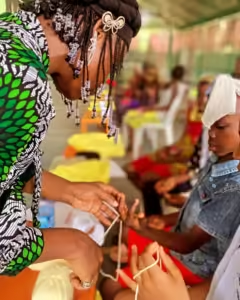 The community shares challenges and discusses strategies. Occasionally, cash donations and support equipment are distributed to families in need. Funds are provided for some to start businesses.
The community shares challenges and discusses strategies. Occasionally, cash donations and support equipment are distributed to families in need. Funds are provided for some to start businesses.
Mothers in the community are volunteering to create awareness that children should always be seen as a blessing.
“These children may not communicate like others, but they are human beings who deserve love,” says Odiete.
They regularly gather over the sharing of laughter, tears, and hugs. “This bonding helps improve our mental health as caregivers of special needs children, a role that comes with many challenges,” she adds.
Faith Gabriel is a 50-year-old civil servant in Kogi State. She recalls how society in general was very insensitive to children with special needs. “One day, I prayed and asked God to take my life,” she says, reflecting on her struggles as she cares for her four-year-old grandson, Eleojo, who has cerebral palsy. “Most of the time, my waist and joints ache because I have to carry him everywhere.”
Faith took Eleojo from her daughter, Blessing, a university student whom her partner deserted after realizing she had borne him a child who he labeled “not normal.” A widow, Faith struggles to make ends meet, frequently running short of money and is forced to borrow from a local saving cooperative.
Earlier last year, Gabriel posted on Facebook that Eleojo needed a medical splint to stand. Odiete followed up and gave the device. “That’s how I got drawn into this community,” Gabriel says. “Whenever I feel tired, I ask myself if if this lady isn’t tired, then neither am I. She has given me hope and strength to continue. If not for her, I would have probably given up.”.
Mothers
Odiete is usually on the forefront and willing to use her music to tell the stories of children with special needs and bring this into the mainstream consciousness.
I still appreciate the donations from Nigerians who have shown generosity. However, the most important aspect is that resources must be forthcoming from the government in terms of reaching the people who should actually provide the necessary aid.
“Some mothers reach out to me and how I’ve helped them embrace their babies,” she shares. “Once, I was listening to women in the market as they were plotting how to harm their children, which is absolutely wrong. Some people lock their babies away and hope that while they are away, the child will die. But that is changing. People are now taking pride in their special needs children. A woman once told me, ‘I have this child, and I can no longer hide them. I will accept them as they are.'”
For more visit : Global hub 360 – Health




